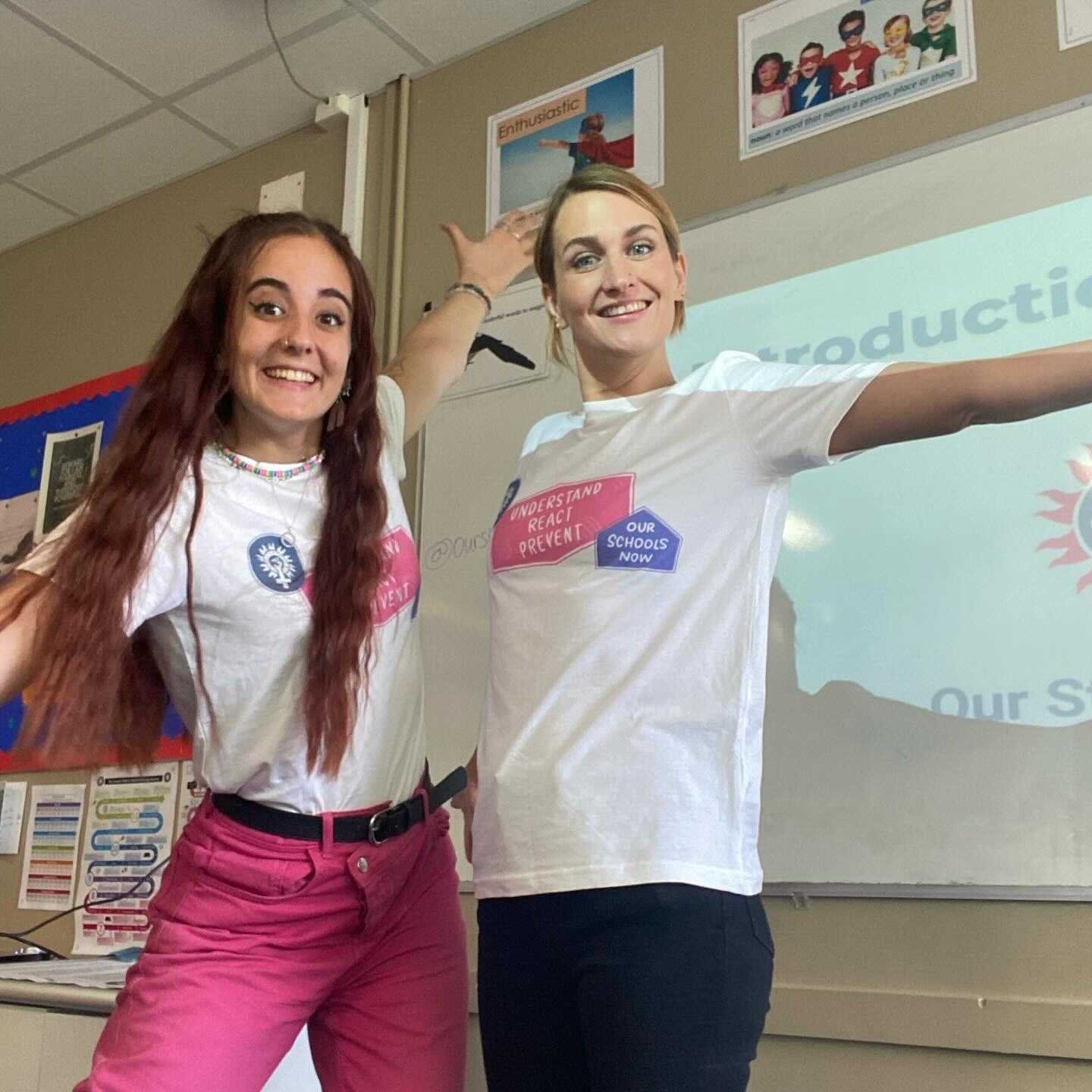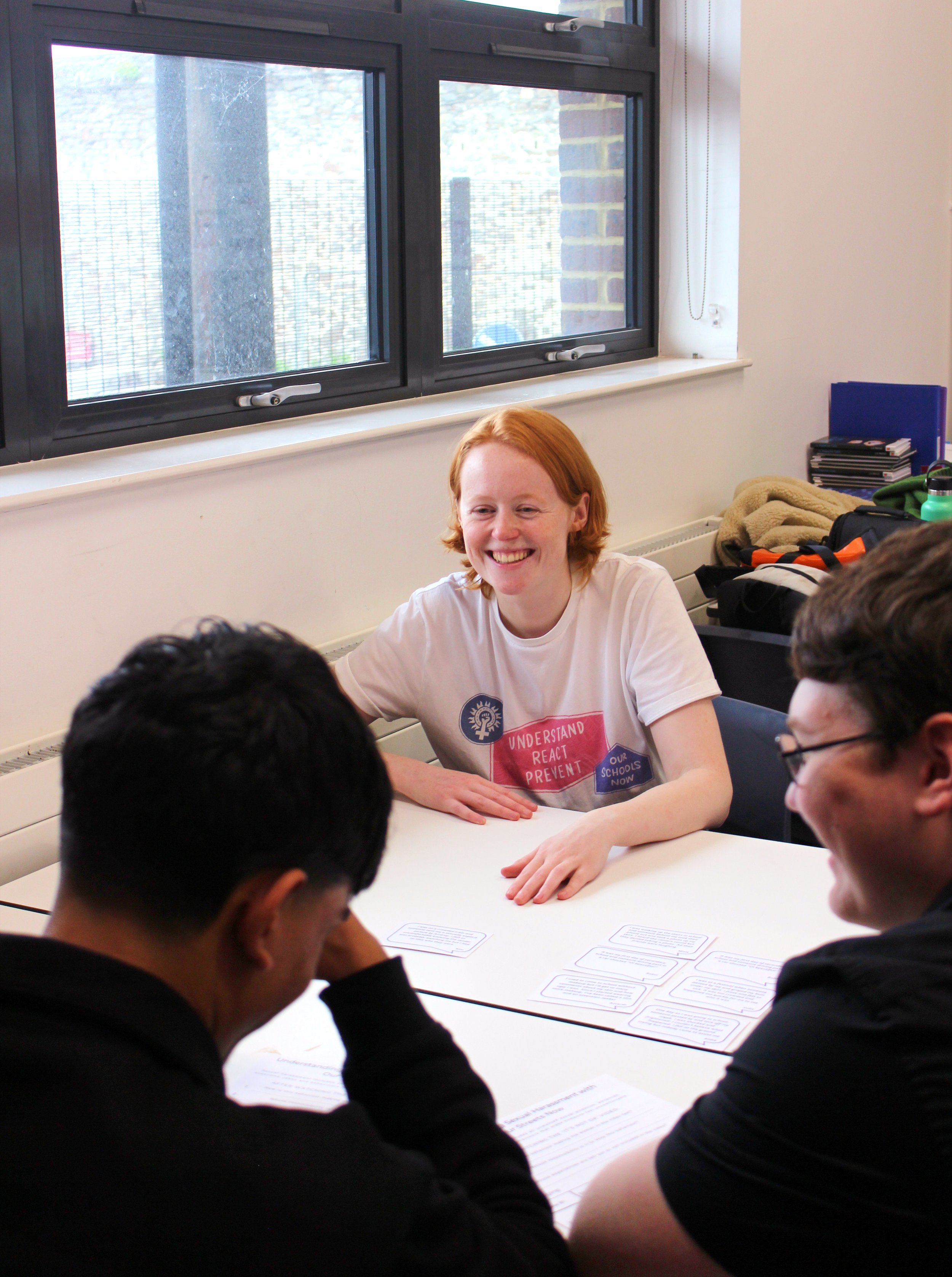Schools & Colleges
At Our Streets Now, we work directly with schools, colleges, and youth centres to tackle sexual harassment through high-quality, evidence-based education.
We offer interactive workshops for students, CPD training for staff, and free teaching resources — all designed to equip students to recognise and challenge harm, while building a school environment where safeguarding against harmful sexual behaviour is active, visible, and effective.
CPD Training
Workshops
Resources
Whether you're looking to deepen your school’s PSHE curriculum, build staff confidence in responding to harassment, or empower your students to challenge harmful behaviours, we are here to help.





Our Programmes
For Young People
Our team has spent years researching public sexual harassment, talking to young people about their experiences and understanding the complex barriers that exist for schools and colleges aiming to make change. We talk to young people using real experiences they can relate to and we give staff an insight into the issues their learners are likely facing.
Our Workshops
-
Suitable for Year 9 and up, this interactive workshop opens up a critical conversation about online misogyny and the role of the digital world in shaping harmful attitudes and behaviours.
We focus on two key areas:
Image-based abuse: Students explore an in-depth scenario showing this issue, unpacking how this is shaped by peer pressure, gendered expectations, and victim-blaming.
Online influence: Students practise applying a critical lens to online content — analysing examples from gaming, music lyrics, and social media to identify harmful messages and understand how these are amplified by algorithms.
Rather than telling young people to avoid the internet, we empower them to navigate it safely. Students leave the session with:
A clearer understanding of how sexual violence can take place online and its impact.
Insight into how gendered norms and peer dynamics can drive digital harm.
Increased digital confidence, media literacy and critical thinking skills.
The tools and language to talk about what they’re experiencing — and to reach out to trusted adults when needed.
Rooted in a safeguarding-first approach and informed by current concerns such as image-based abuse and sextortion, this workshop helps young people stay informed, resilient, and supported online.
-
A discussion-based, interactive session exploring what public sexual harassment looks like, why it’s harmful, and how students can safely challenge it.
Using 12 real-life stories, students explore key questions:
What is sexual harassment, and where’s the line between a compliment and harm?
How is harassment shaped by gender stereotypes?
How does experiencing sexual harassment impact people?
How can we challenge harassment — and why isn’t it always easy?
We’re clear in our workshops that a culture where harassment is normalised harms everyone. Our inclusive approach ensures boys feel engaged, included, and empowered to be part of the solution.
The timings can flex from 50-90 minutes long to suit your timetable and can each accommodate up to 30 students, delivered by 2 facilitators. We can work with an entire year group running one workshop after another one, or running up to three simultaneous workshops. The content slightly varies for different year groups, but in every workshop we aim to give students the space to understand and define sexual harassment, to consider its impacts and to understand their role in challenging harmful language and behaviour. -
Designed for older students, this session takes a deeper look at public sexual harassment and how it is shaped and normalised by the everyday, including gendered stereotypes and the pressures that exist around sex and relationships.
We cover the content in the year 9-11 workshop but take a deeper look at:
Legal and cultural understandings of consent
Gender stereotypes and how they affect sex and relationships
The role of everyday homophobia, transphobia, racism and misogyny in normalising sexual harassment
Objectification and the media
-
Our one hour large-group session designed for sixth form students. We use media and film examples to talk about a culture of sexual harassment, including normalisation, pressure on men and boys, and victim-blaming. Students are encouraged to understand their role in challenging harm, and think critically about the kind of culture they want to shape as they move into adulthood.
For Staff
Our staff sessions are designed to increase confidence from teaching staff in understanding, responding to and preventing public sexual harassment. We also provide free resources, including ready-made lesson plans, and training on how to use them.
-
Our interactive, CPD-accredited training builds staff confidence in responding to and preventing public sexual harassment, both inside and outside the classroom.
We use real student experiences to explore safeguarding responses, support effective teaching strategies, and help staff create safer, more inclusive school environments. The session also introduces our free teaching resources and how to use them with confidence.
We offer training on key areas, all through the lens of public sexual harassment:
Understanding young people’s lived experiences
Exploring root causes and cultural norms
Responding safely and appropriately to disclosures
Teaching about harassment in the classroom
Engaging men and boys in the conversation
Building a whole-school approach to prevention
Using pupil voice meaningfully to drive change
This session supports schools to meet safeguarding responsibilities, while creating space for open, values-led staff reflection and learning.
-
We offer the following free resources for staff, students and parents:
KS3, KS4 and KS5 Lesson Plans and Workshops
Anti-Street Harassment Week Lesson Plan
International Women’s Day Assembly
Introduction to PSH
PowerPoint Assembly Pack
Safeguarding teacher training resource
You can download them here
Download our flyer for more information
92% of girls, and 74% of boys, said sexist name-calling happens a lot or sometimes to them or their peers.
Our Resources
We offer the following free resources for staff, students and parents:
KS3, KS4 and KS5 Lesson Plans and Workshops
Anti-Street Harassment Week Lesson Plan
International Women’s Day Assembly
Introduction to PSH
PowerPoint Assembly Pack
Safeguarding teacher training resource
Our Work In Wales
Ein Strydoedd Nawr yng Nghymru
Our Streets Now in Wales
Yn ogystal â gweithio mewn ysgolion ar draws Cymru, rydym wedi bod yn cynnal rhaglenni peilot mewn partneriaeth â Llywodraeth Cymru
As well as working in schools across Wales, we have been running pilot programmes in partnership with the Welsh Government
Darllenwch ein hadroddiad
Read our programme report here
In collaboration with Safeguarding Network, we have released a free resource for DSLs to train your staff on public sexual harassment.
Testimonials
‘Our students really enjoyed the workshop, and our teachers were incredibly impressed with how well they engaged with the activities. Exploring real-life experiences of PSH helped the students to understand what PSH is and the impact it has on young people. The focus on designing campaigns and being proactive was really engaging, and the students were inspired to be creative, imaginative and productive - producing pieces of work that they were all incredibly proud of. We are looking forward to welcoming the team back to facilitate more workshops with even more students.’
— Emma Beckett - Health & Social Care Lecturer, New College, Swindon.
‘‘I like the control we had in our campaigns and how we were made feel that we’re capable of doing anything’’
— Student after ‘Changemaker Workshop’
‘‘Facilitators were passionate and knowledgeable. Felt like we were learning from experts, rather than people just paid to talk to us.’’
— Staff Member after CPD session
‘‘I liked the interactive element and how the leaders of the session fully explained sexual harassment and how to deal with it’’
— Student after ‘Understanding Sexual Harassment’ workshop
‘‘Really great session. It felt empowering and refreshing, like things are finally changing and being taken seriously. It made me feel hopeful for the future. I feel more confident in how to deal with PSH if I hear anyone talking about it.’’






